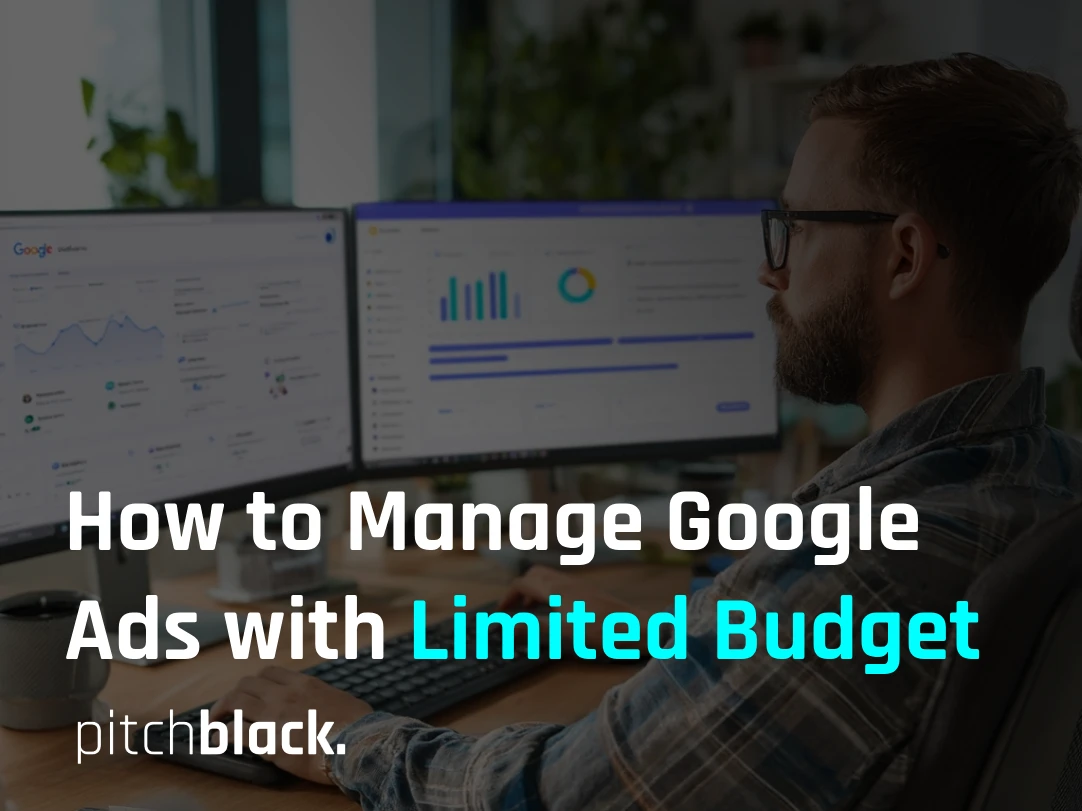
Let's be real: running Google Ads in Perth with a tight budget can feel like trying to squeeze water from a stone. You know you need to be visible, but the thought of pouring money into a black hole of clicks with no return is terrifying.
If the budget is that tight, you probably won't be hiring any google ads management Perth experts and you will be managing this yourself. Have a look at some of the tips below and make sure you visit our Google Ads case studies.
Let's start with good news: it's not only possible to run successful Google Ads campaigns on a limited budget, but it's also incredibly rewarding when you see those conversions roll in. It requires a laser-sharp focus, a bit of patience, and a willingness to be hands-on. So, how do you actually pull this off? Let's break it down, real talk, and transform your modest budget into a powerful marketing tool.
1. Keyword Selection & Match Types
When your budget is tight, you can't afford to be a shotgun sprayer; you need to be a sniper. This means your keyword selection isn't just important—it's paramount.
Focus on Top-Performing Keywords
Forget casting a wide net initially. Dive deep into your niche and identify the absolute highest-intent keywords. These are the phrases people type when they're ready to buy or convert, not just Browse. Think long-tail keywords (e.g., "emergency plumber Perth" instead of just "plumber"). These typically have lower search volume but much higher conversion potential.

Embrace Exact and Phrase Match
This is where you put on your "no nonsense" hat. Google's recommendations often push for broad match, promising more reach. But for budget-conscious campaigns, broad match is a money pit. It's like inviting everyone to your party, even the ones who just stumbled in looking for the bathroom. You'll end up paying for irrelevant clicks that drain your budget faster than you can say "conversion."
- Exact Match ([your keyword here]): Your ad will only show for searches that exactly match your keyword or very close variations with the same meaning. This is the tightest control.
- Phrase Match ("your keyword here"): Your ad will show for searches that include your keyword phrase, along with other words before or after it. This offers a little more flexibility than exact match without the wild west feel of broad.
Why Broad Match is a Budget Killer
Broad match is notorious for pulling in "unnecessary junk". Searches that are tangentially related but ultimately irrelevant to your offering. You'll get clicks, sure, but they'll be from people who have no intention of becoming your customer. It's a magnet for wasted spend. Stick to exact and phrase match to ensure your ads are seen by the right eyes.
2. The Budget Sweet Spot: Finding Your Minimum Viable Spend
Yes, we know your budget is limited, but here's a crucial truth: it can't be too low. Google Ads operates on an auction system. If your daily budget is minuscule, you simply won't have enough "fuel" to compete and show your ads consistently, if at all.
What's the Bare Minimum?
For most industries, especially competitive ones, aiming for around $30 per day is often the bare minimum to see any meaningful traction. This isn't a hard and fast rule, as some ultra-niche, low-competition markets might get by with less, but it's a good starting point.
Why $10/Day Won't Work
A $10/day budget might seem like a safe starting point, but in reality, it's often a fast track to disappointment. You'll quickly deplete your budget with just a few clicks, your ads will stop showing for the rest of the day, and Google's algorithm won't gather enough data to optimise effectively. You need enough daily spend to generate a decent volume of clicks and impressions for the system to learn and for you to analyze. Think of it as giving your car just enough gas to get out of the driveway, then running out before you reach your destination.
3. The Power Duo: Killer Ads & Conversion-Focused Landing Pages
Your keywords get people to see your ad, but your ad and landing page are what convert them into customers. Don't underestimate this critical step!
Craft Compelling Ads (That Skim Well!)
Most of your potential clients won't read your entire ad copy. They skim. Their eyes will dart around, picking up a couple of key phrases. This means every word counts, especially in your headlines and descriptions.
- Integrate Your Keywords: Naturally weave your targeted keywords into your ad copy. This reinforces relevance to the user's search and often improves your Quality Score.
- Present an Irresistible Offer: What makes you stand out? Is it a special discount, a free consultation, a unique service? Make it clear and compelling.
- Highlight Key Benefits: Focus on what the customer gains, not just what you offer. "Solve your plumbing emergency fast" is more impactful than "We offer plumbing services."
- Clear Call-to-Action (CTA): Tell them what to do next: "Call Now," "Get a Free Quote," "Shop Deals."
The Non-Negotiable: A Dedicated Landing Page
This is HUGE. Directing paid traffic to your general homepage or a random service page is like inviting someone to a party and then making them wander through your entire house to find the living room. It's confusing and inefficient.
- Purpose-Built: Your landing page should be singularly focused on the specific offer or service your ad promotes.
- Visual Hierarchy: The most important information should be "above the fold" (visible without scrolling).
- Forms & CTAs Galore (Strategically Placed): Have at least one conversion form above the fold. Scatter a couple of clear Calls-to-Action throughout the page. Make it easy for people to convert.
- Mobile-First is Mandatory: Over 65% of your potential clients (and often much more, depending on your industry) will access your page from mobile devices. Your landing page must be perfectly optimised for mobile: fast loading, easy-to-fill forms, clear visuals, and readable content without excessive zooming or pinching. Test it thoroughly on various devices!
4. Search Terms Audit & Negative Keywords
This is probably the most important, and often overlooked, part of your budget-conscious Google Ads strategy. It's not a one-and-done task; it's a daily ritual.
Monitor Search Terms Daily
Go into your Google Ads account, navigate to "Keywords," and then "Search Terms." This report shows you the actual queries people typed into Google that triggered your ads. This is gold!
Ruthless Exclusion of Irrelevant Keywords
As soon as you see a search term that is irrelevant to your business or offer, add it as a negative keyword. Don't hesitate. This is how you prevent future wasted spend.
For example, if you sell "luxury watches" and you see search terms like "how to fix a watch" or "cheap watch battery," add "fix," "repair," "cheap," "battery," etc., as negative keywords.
Why This Is Critical for Budgets
The less budget you waste on irrelevant clicks, the more budget remains to go towards valuable, converting traffic. This daily audit directly impacts your ROI and ensures every dollar works as hard as possible. It's like plugging all the tiny leaks in your budget bucket.
Have a look at our google ads case study how your campaign can benefit from proper and regular search term audits.

5. Recommended Settings
Google Ads has a dizzying array of settings. For a limited budget, many of them are traps designed to spread your money thin. Be selective and strategic.
- Avoid "Smart Campaigns" at All Costs: While Google promotes these for ease of use, they offer very little transparency or control. You'll spend money, but you'll have no clear idea where your ads are showing, what keywords are triggering them, or how effectively they're performing. Stick to expert mode and build campaigns manually.
- Untick "Search Partners": In your campaign settings, under "Networks," you'll see an option to include "Google Search Partners." While it sounds appealing, traffic from these non-Google search sites often has lower intent and conversion rates. For a tight budget, this is another source of wasted spend. Keep your focus purely on the main Google Search Network.
- Separate Search & Display Campaigns: Never use the "Search Network with Display Select" option. These are fundamentally different advertising channels that require different strategies, ad copy, and targeting. If you want to run a Display campaign, set it up entirely separately with its own budget and targeting. Mixing them will dilute your budget and make optimization incredibly difficult.
- Leverage Ad Schedule & Demographic Exclusions:
- Ad Schedule: If you know your customers only convert during specific hours (e.g., during business hours for B2B, or evenings for a restaurant), use ad scheduling to only show your ads when conversions are most likely. Why pay for clicks at 3 AM if no one's buying?
- Demographic Exclusions: If your target audience is, for example, 35-65 year olds, exclude younger or older age groups. If you exclusively sell to women, exclude men. This refines your targeting and prevents irrelevant impressions.
- Conversion Tracking is Non-Negotiable: This isn't just a setting; it's the lifeline of your campaign. Make absolutely sure your conversion actions (e.g., form submissions, phone calls, purchases) are set up properly and are firing accurately. Without this data, you're flying blind, unable to optimise or even know if your campaigns are working.
6. The Bidding Strategy Evolution: Manual to Automated
When your budget is very limited, starting with Manual CPC (Cost-Per-Click) is often the smartest move. This gives you absolute control over how much you're willing to pay for each click. You can set lower bids for less important keywords and higher bids for your absolute top performers.
Once you've run your campaigns for a month or two, and when you've gathered a significant amount of conversion data (ideally 15-30 conversions per month at the campaign level), then you can consider switching to automated bidding strategies like "Maximise Conversions." Google's algorithms are incredibly powerful, but they need data to learn and optimise effectively. Trying to "Maximise Conversions" without sufficient conversion data is like asking a chef to cook a gourmet meal without any ingredients.
Managing Google Ads on a budget isn't about cutting corners; it's about being strategic, focused, and incredibly efficient. By meticulously managing your keywords, being smart with your budget, perfecting your ad and landing page, diligently auditing search terms, and nailing your settings, you can transform a limited budget into real, tangible results. It takes consistent effort, but the payoff of seeing those conversions come in on a lean spend is truly satisfying. Good luck, and happy optimising! If you have any questions, please reach out to our ppc management experts.
 0413 107 893
0413 107 893